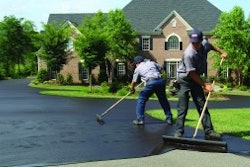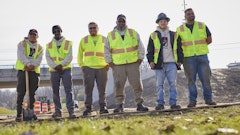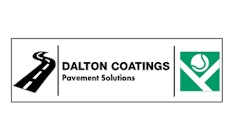
In June 1976, Lee Lowis looked for a summer job between college semesters. He applied at Goddard-Dennis, a seal coating and tennis court company in the Detroit area. They declined his application because they did not hire college students. A couple of weeks later, he went back and asked them to reconsider, which they did. Little did he know that a summer job would lead to more than four decades of service to the industry.
Goddard-Dennis was large enough to own its own manufacturing company, Surface Coatings. Lowis spent several years learning the business as a laborer on Goddard crews. The company resurfaced 300-400 courts per year and applied over 300,000 gallons of sealer installed annually.
A few years later, one of the owners left and went to work for Wikel Mfg in their Atlanta, GA facility and offered Lowis a job as the assistant plant manager and salesman. The move to Georgia eventually opened the door for another opportunity, vice president and general manager of a contracting company in South Carolina.
Lowis grew the business by doubling the seal coating work, expanding the tennis court business to over 100 courts annually, and increasing the margins. He earned his designation as a Certified Tennis Court Builder, which he maintained for more than 20 years.
Having helped cultivate extraordinary growth within that opportunity, Lowis decided to go back to Wikel Mfg. In this new chapter with Wikel, Lowis would serve as both plant manager and salesperson at the plant located in Harrisburg, PA. Lowis recalls, “The Harrisburg facility presented many opportunities to create new efficiencies; within one year, we were able to make it the most efficient plant at Wikel," he said. The efficiencies increased sales volume and margins within a year.
Early in 1987, Lowis received a call from the new owners at Goddard. With rumors about Wikel changing ownership (soon to become SealMaster), Lowis and his wife Merry decided it was time to make one last move.
After two years focusing on Goddard’s contracting business, he approached ownership with a proposal; devote 100% of his time to developing Surface Coatings. At that time, eight manufacturers were competing for the Michigan market. Surface Coatings was the smallest and perceived as a competitor because Goddard owned them. It would only be a few years before Surface Coatings outpaced Goddard and the companies separated.
In 1990 Lowis bought into the business, and Surface Coatings began to reap the rewards. At first, growth was slow. Lee looked for business as far away as Western Pennsylvania and West Virginia. Closer to home, the company found success in Northern and Western Michigan and Ontario. Outside vendors began to notice, which allowed Surface Coatings to offer new products. With Lowis’ guidance and careful planning, Surface Coatings became the largest fulfillment supplier to the online pavement supply sites, shipping across the country.
Surface Coatings began holding regional seminars focusing on ways to help contractors expand and run their businesses more efficiently. The idea was a hit, and the events drew as many as 25 outside vendors and over 150 contractors. By the end of the ’90s, Surface Coatings was Michigan’s largest supplier of pavement maintenance products. By 2012 they had increased tenfold, and only two other manufacturers had a significant presence in the state.
In 2012 GemSeal purchased Surface Coatings. Lowis agreed to stay on. By 2014 he managed four GemSeal territories and, in 2016, became GemSeal’s vice president.
In 2016, Oldcastle sold GemSeal to a private equity firm. In August of 2018, Lowis became president and soon added the title of chief executive officer.
“It is important to note that GemSeal would not have purchased Surface Coatings without the hard work and effort of everyone at Surface Coatings,” said Lowis. “The resulting mergers and acquisitions would not have taken place. Whatever success I’ve had started with Surface Coatings and the people who believed in what we did. The co-workers at GemSeal supported that same philosophy.”
Lowis has seen many changes with his 46 years of insight, including equipment advancements to help contractors do their jobs more efficiently, manufacturers reaching a broader customer base with new products, and the impact of the internet on marketing and production. He has presented at NPE on multiple occasions and authored several articles in trade publications. He also was influential behind the scenes in other companies. He was part of a group that purchased KM International (has since sold his interest to the current ownership) and assisted in the rollout of Diamond Shield Fortifier.
“In the early 2000s, we saw a significant increase of seal coat manufacturers, to the point that we now have a high rate of excess capacity,” said Lowis. “And, in the past ten years, we have seen a vast expansion of small asphalt emulsion manufacturers to the marketplace.”
“The coal tar shortages in 2007 and 2008 brought higher prices for materials and a focus on alternative raw materials,” said Lowis. “Coupled with Government regulations, the industry quickly began to change.”
Lowis explained when he went to his customers and explained that Surface Coatings, and the industry at large, faced the possibility that it would not have the supply to produce the volume of coal tar they needed. “We searched and found additional suppliers and made it work. But, we warned our customers of possible supply issues and kept them informed as the situation changed.”
By listening to his customers and looking for opportunities, Lowis created brand loyalty and dynamic company culture, contributing to his industry success.
“I wish that I could say that we had a grand design, but it was more of a down-to-earth approach,” he said. “Help the customer grow their business, provide solutions to their problems and be a resource for them.”
Turning Challenges into Opportunities
Every journey has its challenges and handling those issues can be a delicate balancing act. Lowis said the biggest challenge facing the industry right now is social media. However, when managed successfully, contractors can convey a greater message.
He recommends contractors rethink social media use and, instead of getting into debates and arguments with others that the public might see, casting a negative light on the industry, instead showcasing what work has been done to better the communities.
"When covered, our industry is not well known and often maligned by the media," said Lowis. "The times that people notice what we do is when we are inconveniencing them; there is traffic back up because of road repair, or they can't park close to a building because of parking lot work. So, why draw negative attention when we don't need to? Instead, use social media platforms to highlight what you do well, and better still, what you have done in your local community to make it a better place."
Giving Credit Where It's Due
Through a series of decisions, Lowis developed a desire to lead by example and a skill set that enabled him to thrive in his career. However, he credits the network of vendors who gave his company loyalty, his employees who were always willing to be completive, and his devoted wife, Merry.
"Whatever I have accomplished over the past 46 years would not have happened without my wife, Merry," he said. "She supported every career move, every idea, every investment and location change. Most spouses would not have been as willing to do the things we did. Because of Merry, I have had a measure of success."
For his efforts and contributions to the pavement maintenance industry, Lee Lowis has been inducted into the Pavement Hall of Fame.











![Lee Boy Facility 2025 17 Use[16]](https://img.forconstructionpros.com/mindful/acbm/workspaces/default/uploads/2025/09/leeboy-facility-2025-17-use16.AbONDzEzbV.jpg?ar=16%3A9&auto=format%2Ccompress&fit=crop&h=135&q=70&w=240)








